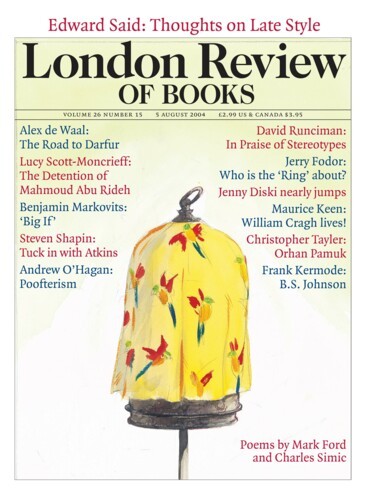Not since the belle époque of Sartrean existentialism have we had a better reason to stop and ask ourselves what it is exactly to ‘act in good faith’. For that is what the prime minister promised the House of Commons he had been acting in when marching lockstep into Iraq with his role model in Washington. Tony Blair’s assurance was given as a response to the publication of the Butler Report (Stationery Office, £22.50), which he assumes has demonstrated that he is not in fact the Bliar of all those banners that were carried down Whitehall eighteen months ago. The report does no such thing, because no report, even one a great deal more muscular than the Whitehall insider’s memorandum to which Lord Butler has given birth, has the capacity to settle whether Blair was acting in good faith over Iraq, since if to act in good faith is to act in the conviction that what you are doing is right, regardless of any empirical evidence that may convince other people it is not right, good faith becomes a purely private matter, a state of mind inaccessible to investigation by committees, unless we were to have one drawn from the Institute of Psychiatry, rather than Butler’s cosy quintet of Right Honourables. As so often when finding himself in a spot of moral bother, Blair the asylum-seeker has chosen to tiptoe into the snuggery, or what he has been known to evoke as his ‘conscience’, where the poor earthlings of his electorate can’t expect to be admitted.
It is mighty offensive, not to say deceitful, to justify taking a particular course of political action on grounds of your good faith when its consequences are as illegal, lethal, imperilling of the future and divisive as on this occasion. Sartre, the apostle of transparency, was naturally less concerned with how we might identify good faith when we meet it than with the exposure of bad faith, and for all its timidity the Butler Report contains enough evidence to show that if Blair and those close to him were not acting in bad faith when they concluded, on the strength of intelligence that they had been given, that they had a sufficient casus belli in Iraq, then they were in a collective state of gullibility unfitting them for office.
We have known for at least a year now that the original wording of the intelligence later presented to the cabinet, or those members of it deemed fit to be let in on the decision, was markedly different – more cautious and, in a number of instances, explicitly speculative – from the wording in which the contents of that intelligence were conveyed from Blair’s charmed circle to other MPs and the country at large. You might think that the good faith argument could hold only if Blair himself was unaware that the wording had been changed, and in what direction.
Butler brings out all too starkly the amateurishness and inadequacy of the intelligence gathering where Iraq was concerned. It derived from few and seldom properly validated sources: dissidents, defectors, eager romancers. One of them, we have only just learned, was so unreliable that his reports were later – meaning after the war – withdrawn by the intelligence service itself, and the report concedes in its conclusions on the sources of intelligence that the most reliable ones were ‘the least worrying’. One person thoroughly vindicated is Dr Brian Jones, the sidelined MOD analyst who complained at the time about the tabloidisation of the intelligence material, not least its repeated use of what even George Tenet, in the days when he was still hanging onto his job as head of the CIA, is quoted in Butler as describing as ‘that 45-minute shit’.
What Butler doesn’t do, as we might have known he wouldn’t, is tell us how many individuals and which ones adulterated the intelligence wordings in the worrying sense. It’s quite extraordinary that the ghastly Alastair Campbell, Blair’s PR man now turned vaudevillian, was not even asked to give evidence to Butler’s committee. The incriminated dossier of September 2002 was of course presented as the work of the Joint Intelligence Committee but – Butler p. 154, and this is about as tough as the Report ever gets – ‘the publication of such a document in the name and with the authority of the JIC had the result that more weight was placed on the intelligence than it could bear.’
We know from Hutton, however, that the JIC wasn’t simply the fall guy in this deception, since its members had played their part in meeting the not so subconscious desires of their political masters and dressing the intelligence up. So should John Scarlett, the head of the JIC, take the rap? Not according to Butler: ‘We realise that our conclusions may provoke calls for the current chairman of the JIC, Mr Scarlett, to withdraw from his appointment as the next chief of SIS [MI6]. We greatly hope that he will not do so. We have a high regard for his abilities and his record.’ Once you’ve read what Butler has to say elsewhere about the failure of MI6 over many years in keeping tabs on Iraq, you might dismally conclude that it will shortly have the leader it deserves.
Send Letters To:
The Editor
London Review of Books,
28 Little Russell Street
London, WC1A 2HN
letters@lrb.co.uk
Please include name, address, and a telephone number.

